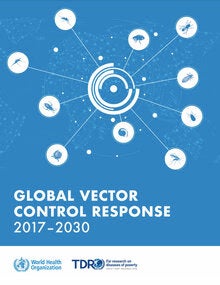The Global vector control response 2017–2030 was developed through an extensive consultation process that began in June 2016 with the aim of adoption of the response by the Seventieth World Health Assembly in May 2017. The response was prepared in close collaboration with numerous experts and partners worldwide and under the overall leadership of Pedro Alonso, Director of the Global Malaria Programme, Dirk Engels, Director of the Department of Control of Neglected Tropical Diseases, and John Reeder, Director of the Special Programme for Research and Training in Tropical Diseases.
The preparation of the response was supported by a Steering Committee chaired by Ana Carolina Silva Santelli and Thomas Scott. Other members included Kalpana Baruah, Daniel Boakye, Tom Burkot, Maureen Coetzee, Steven Lindsay, Qi Yong Liu, Elfatih Mohamed Malik, Alan Schapira, Willem Takken, Madeleine Thomson and Graham White. For their critical inputs to drafting and editing, we thank the following WHO staff: Mathieu Bangert, Karen Ciceri-Reynolds, Amadou Garba Djirmay, Anna Drexler, Christopher Fitzpatrick, Florence Fouque, Tessa Knox, Abraham Mnzava (former staff), Ashok Moloo, Mariam Otmani del Barrio, Edith Patouillard, Camille Pillon, Martha Quiñones, Emmanuel Temu, Raman Velayudhan and Rajpal Yadav. We also thank Steven Lindsay and Willem Takken for their key contributions to drafting, and to Catherine Moyes, Donald Shepard and Anne Wilson for providing additional material.
The online consultation was coordinated by Ryan Williams. Tessa Knox and Erin Shutes coordinated the official documentation process for the Executive Board and the World Health Assembly. Administrative support was provided by Pearl Harlley. Regional focal points for malaria and vector-borne diseases and their teams in WHO’s regional and country offices provided extensive input and support for regional consultations that facilitated the engagement of technical experts from numerous Member States. WHO is grateful for all of their contributions, especially to Rabindra Abeyasinghe, Birkinesh Ameneshewa, Hoda Atta, Caroline Barwa (former staff), Haroldo Bezerra, EvaMaria Christophel, Elkan Gasimov, Mohamed Jamsheed, Michael Macdonald (former staff) and Ghasem Zamani.
|

